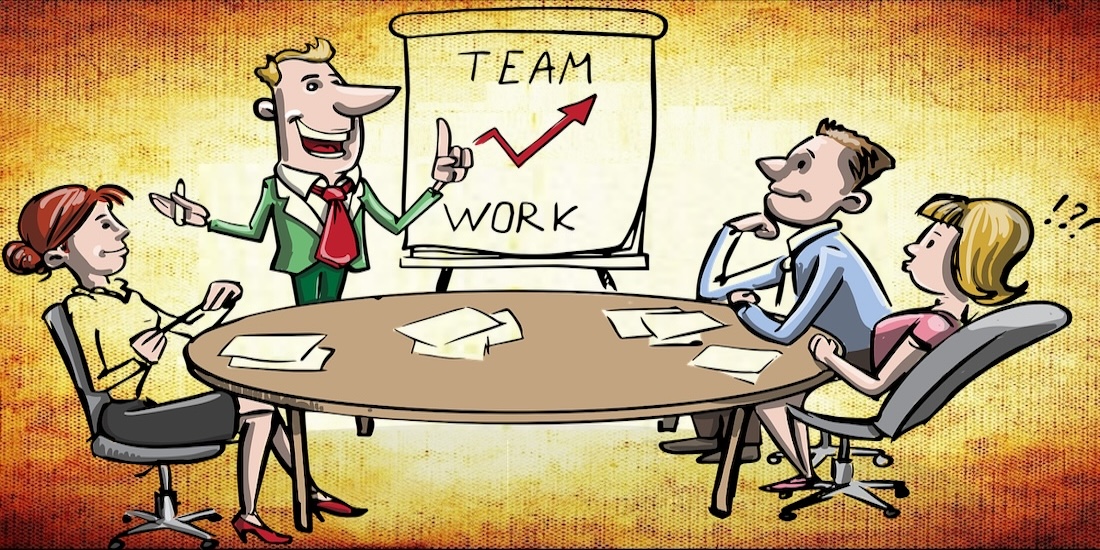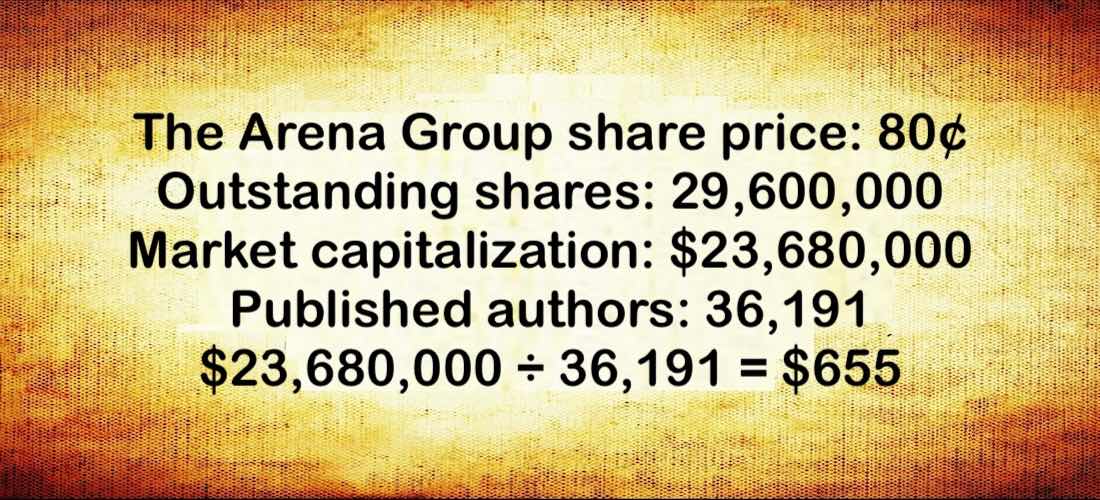
Currently, HubPages authors can take entire ownership of The Arena Group (NYSE: AREN) since its market capitalization has significantly dwindled.
That presents an opportunity for the platform to be revived through a collective effort. That would be possible if enough of us had the shares to apply our voting rights in a majority vote. Then, we could return to the methods HubPages originally had that worked.
I'll begin with a review of the history that led to where we are now, and then I'll discuss how HubPages authors can gain complete control.
When Maven acquired HubPages in 2018, I was offered an all-expenses-paid trip to Canada with 25 other authors to attend a conference where they presented their plan for the site.
I was so enthusiastic about the plan that I bought a few shares of Maven's stock after returning home. Those shares have since been converted to The Arena Group (NYSE: AREN).
Unfortunately, my shares have lost most of their value since then, falling from a high of $21.78 in September 2020 to under 80¢ in June 2024. That reflects how poorly the business has been conducted, impacting the authors' earnings.
VITAL UPDATE: Interestingly, since I wrote this article in June 2024, the share price has dropped as low as 61¢. But then, in November 2024, it suddenly more than doubled to $154. The remainder of this article does not reflect that increase and is based on the original 80¢ value.
HubPages' original staff knew what they were doing to make the company profitable. That was evident in how we (the authors) made a decent income from our published articles. My monthly royalties reached four digits a few times in 2019, a testament to the platform's past success that we all fondly remember.
That profitable business was undoubtedly the reason for Maven's desire to purchase HubPages.
Significant changes were implemented under Maven's ownership. One of the first projects was to migrate all our articles to their platform. However, this transition was error-prone.
The new platform did not support the reader-friendly format that HubPages was known for. As a result, several features were broken, and some were removed, such as user polls, quote formats, table-of-contents linking, and reader comments.
After The Arena Group continued hosting our articles on their server, reader views dropped drastically. Some may argue that this is due to the algorithm changes Google keeps experimenting with. However, I differ in opinion since a significant component is reader retention.
If we can't keep readers engaged, they never finish an entire article, so much of the advertising is missed. Lacking that, we don't earn ad revenue. However, proper ad placement is crucial for a well-balanced reader experience.
When people search the Internet, they expect to see ads. They are accustomed to that. However, the page formatting The Arena Group uses, especially with the repetitive ads breaking up crucial text segments, is a source of disappointment and concern.
With ads appearing every few sentences and even between bullet points in lists, it's difficult for readers to stay focused.

That causes readers to give up, leading to reduced retention statistics, as I see in the stats reports compared to years ago. That caused a significant blow to our earnings and the overall health of the platform.
The overabundance of ads causes other problems. For instance, when I read someone's article on my iPad, the page frequently reloads due to ads using excessive resources.
This condition disrupts my reading experience. It causes me to lose my place, and eventually, I give up trying to finish the article. If this happens to me, I'm sure it happens to others. This also could lead to a loss of readership.
We never had these problems when our content was hosted on HubPages' servers. But The Arena Group insisted on using their own when they bought HubPages. And it appears their equipment is inferior to what we have before.
And that includes the programming IT department as well. I recall how well HubPages' staff responded to our suggestions. I even had some personal experiences. Being a computer programmer and systems analyst, I offered suggestions. And they implemented them without hesitation.
Now, with The Arena Group, it's disheartening to see management consistently disregarding authors' suggestions posted in the forums.
We used to have close communication with staff. Now, many editors hide behind anonymous emails, and they seldom respond when we ask questions after they make strange changes to our content.
I'm also perplexed about their attitude toward rejecting updates we make based on suggestions they previously made in the weekly newsletter.
The breakdown in communication is glaring. There have been instances where I've made changes to my articles based on their suggestions, only to have an editor undo my updates.
This lack of understanding among the staff is concerning. They don't even seem to be aware of the content in their own newsletters!
Here's the part you've been waiting for. With the uncertain future of The Arena Group, it's natural to feel a sense of frustration and concern. I understand the need for a solution, even if it's just a hypothetical one.
So, purely for fun, I began researching how feasible it would be for all active authors on the HubPages platform to invest in shares of The Arena Group stock to the extent that we all own a majority of the company.
With the current value of The Arena Group stock (NYSE: AREN) at 80¢, and considering the number of active authors on the HubPages platform, it's feasible for us to gain complete control over The Arena Group.
That could pave the way for us to make the changes needed to initiate a recovery. So, let's review the financial details.
As of July 1st, 2024, The Arena Group stock traded just under 80¢, with 29,600,000 outstanding shares and a market cap of $23,680,000.

HubPages has 36,191 published authors as of July 1st, 2024, so doing the arithmetic, if each one would invest $655 in purchasing The Arena Group stock, we would collectively have full ownership and control over the entire company!
Many of us earned that much each month when HubPages was a private company before The Arena Group took over.
Those days are gone, and we don't know if the earnings downturn resulted from changes made to the platform or if Google's algorithms contributed to it.
Investing $655 might not be practical for most authors these days. But how might it work if some people with available funds would invest more? That might balance out, so fewer authors owning shares would be needed for this venture to have a majority vote.

Either way, I know this is never going to happen. Expecting a sufficient number of active authors to do this is unrealistic. In addition, other issues stand in the way.
For example, considering the sudden influx of buyers of shares, one has to consider the availability of the shares to be purchased. Those holding outstanding shares might be unwilling to sell, making additional shares unavailable for trading.
I'm sure many insiders holding shares would never release control to a group of outsiders.
If too many shares are held by people not interested in fixing the problems, we won't have the control required to enforce the needed changes. Besides, the share price could increase substantially due to the sudden massive number of investors. So, it would be impossible for all of us to invest at the present low net asset value.
Therefore, this idea of mine is not even something to consider becoming a reality. It's more challenging than it seems at first. Nevertheless, it was fun imagining it as a possibility. Wasn't it?
So, what can we expect in reality for the future of HubPages?
Discover has always been the place for content that didn't have sufficient EEAT or the quality standards necessary to be considered for a niche network site. Now, The Arena Group wants to put everything on Discover. The damage might be irreversible if that fails!
The Arena Group claims that Discover has more earnings potential, but that has never happened. It is questionable at this point, and there is no proof to the contrary.
Not long ago, staff insisted that we should never include a link to Discover or HubPages in our articles because of its low rating with Google. They never explained why they changed their minds.
I don't understand The Arena Group's reluctance to try more beneficial experiments first, such as fixing how excessive ads are counterproductive, with their inappropriate placement every few sentences and breaking bullet lists into incomprehensible pieces.
I keep focusing on the ad situation because I remember when HubPages had a policy of limiting ads to only three per page. My earnings reached four figures back then. So, it has been proven that fewer is better.
I predicted the demise of other content sites, such as InfoBarrel and Bubblews, due to their flawed business practices. Since The Arena Group took over HubPages, I have seen similar patterns developing.
My optimism for HubPages was based on their team of professional editors, who scrutinized our articles for the quality of our work, promoting only the best and encouraging continuous improvement.
Unfortunately, now The Arena Group has dismissed all editors and reduced staff to just a few remaining. Therefore, I expect to see the demise of HubPages very soon unless a new investor takes over and replaces it with the platform that was so successful before HubPages was sold to Maven in 2018.
The views on HubPages keep dropping. That reduces authors' residuals and has a tremendous negative effect on The Arena Group's business.
Writing new content has become a reduced priority for writers due to the decreased earnings. I also think The Arena Group has reduced its priority with HubPages. And that could be due to the extreme reduction in corporate profits.
I know things are different today, especially with changes in search engine algorithms. That's why I wish HubPages would try reducing ads as an experiment.
Of course, it's not HubPages that's in control. I realize that, too. The Arena Group has to be willing. And as far as I can see, they have been destroying HubPages with no desire to listen to reason. It's only expected that, at some point, The Arena Group would pull the plug on HubPages.
I'm already seeing limited support from staff, which is unusual. And some editors who were helpful in the past have been laid off.
From my perspective, and that of many other authors, the frequent placement of ads disrupts the reading flow, often leading to readers giving up and leaving. Google interprets this behavior as a lack of value in our content, resulting in a drop in our search rankings.
So, even the best-quality content is being hurt by how our content is hosted. And that directly affects the earnings of the entire company.
The financial repercussions of The Arena Group's management are evident. The value of the stock is plummeting, and our income has significantly decreased to the point where it's not worth writing new content anymore.
Nevertheless, I still feel that HubPages has potential when compared with what I experienced writing on platforms that failed.
We just need staff willing to listen and test our suggestions. We don't have many choices of professionally managed platforms remaining on which to publish.

Despite the reasons I mentioned why this idea won't work, someone with deep pockets and an interest in publishing educational content online could get involved.
The only way my idea has any hope of success would be to create a combined entity involving all investors interested in making the enhancements necessary for the kind of growth HubPages once had.
That would require a team of attorneys familiar with such a strategy. It may be as easy as creating a limited partnership, such as a limited liability corporation (LLC).
Then, all the authors would have the safety of being limited partners and still have a combined ability to achieve the work required to bring us back into profitability for authors who put all their hard work and energy into writing quality content.
I imagine this undertaking is something Elon Musk or Jeff Bezos would do. With such a low market capitalization of the Arena Group, paying $23 million for an entire company is trivial for either of them.
Furthermore, they would get over 36 thousand active and proven writers ready to return to work. Plus, they have the proper connections with legal tycoons who know how to put this together.